University Assignment: Data Analytics and Big Data in Healthcare
VerifiedAdded on 2022/11/24
|7
|1373
|399
Report
AI Summary
This report explores the application of data analytics and big data in the healthcare sector. It begins with an introduction defining data analytics and big data, highlighting their roles in improving productivity and efficiency. The discussion section analyzes two research articles, one focusing on adaptive-data analytical techniques for causal treatment effects and the other on the wide-ranging applications of big data analytics, including predictive analysis. The report further discusses future applications such as improved management of causal diseases and the automated provision of solutions for diseases. It predicts the impact of these data analytic processes, including error reduction in medications, reduced hospital costs, and improved patient outcomes. The report concludes by summarizing the benefits of data analysis in healthcare, emphasizing its role in efficient data management, error prevention, and enhanced quality of services. The report references several scholarly articles to support its findings.
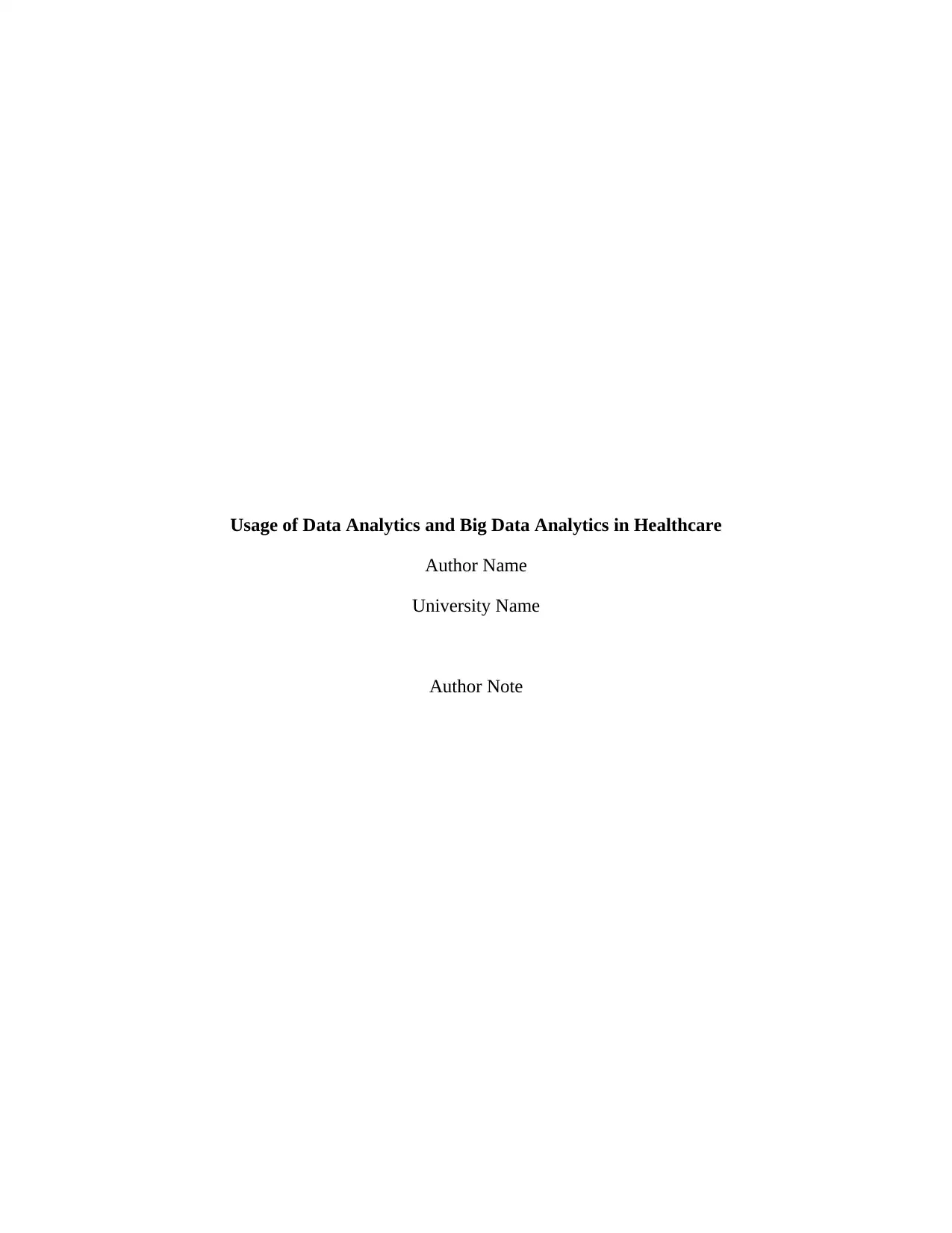
Usage of Data Analytics and Big Data Analytics in Healthcare
Author Name
University Name
Author Note
Author Name
University Name
Author Note
Paraphrase This Document
Need a fresh take? Get an instant paraphrase of this document with our AI Paraphraser
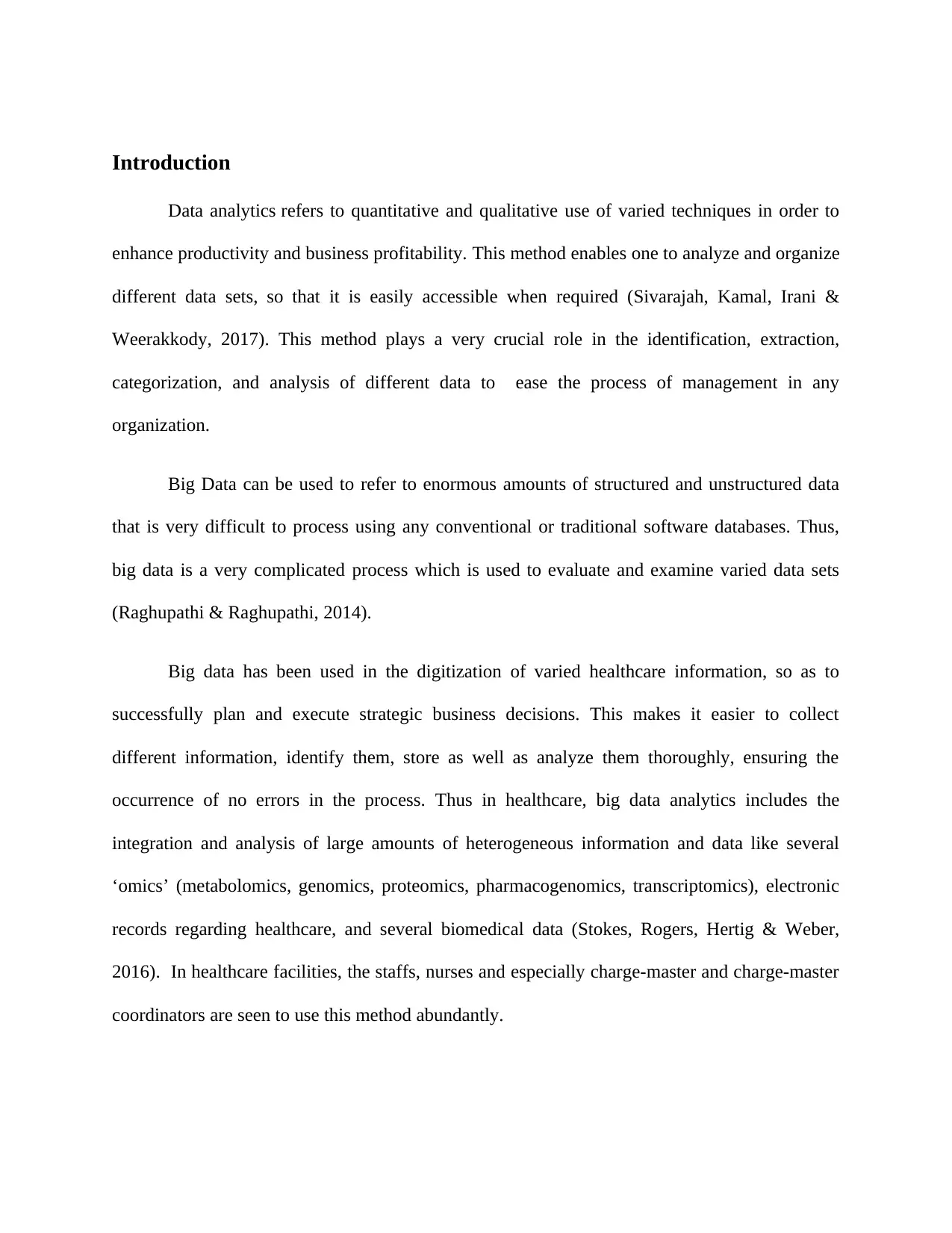
Introduction
Data analytics refers to quantitative and qualitative use of varied techniques in order to
enhance productivity and business profitability. This method enables one to analyze and organize
different data sets, so that it is easily accessible when required (Sivarajah, Kamal, Irani &
Weerakkody, 2017). This method plays a very crucial role in the identification, extraction,
categorization, and analysis of different data to ease the process of management in any
organization.
Big Data can be used to refer to enormous amounts of structured and unstructured data
that is very difficult to process using any conventional or traditional software databases. Thus,
big data is a very complicated process which is used to evaluate and examine varied data sets
(Raghupathi & Raghupathi, 2014).
Big data has been used in the digitization of varied healthcare information, so as to
successfully plan and execute strategic business decisions. This makes it easier to collect
different information, identify them, store as well as analyze them thoroughly, ensuring the
occurrence of no errors in the process. Thus in healthcare, big data analytics includes the
integration and analysis of large amounts of heterogeneous information and data like several
‘omics’ (metabolomics, genomics, proteomics, pharmacogenomics, transcriptomics), electronic
records regarding healthcare, and several biomedical data (Stokes, Rogers, Hertig & Weber,
2016). In healthcare facilities, the staffs, nurses and especially charge-master and charge-master
coordinators are seen to use this method abundantly.
Data analytics refers to quantitative and qualitative use of varied techniques in order to
enhance productivity and business profitability. This method enables one to analyze and organize
different data sets, so that it is easily accessible when required (Sivarajah, Kamal, Irani &
Weerakkody, 2017). This method plays a very crucial role in the identification, extraction,
categorization, and analysis of different data to ease the process of management in any
organization.
Big Data can be used to refer to enormous amounts of structured and unstructured data
that is very difficult to process using any conventional or traditional software databases. Thus,
big data is a very complicated process which is used to evaluate and examine varied data sets
(Raghupathi & Raghupathi, 2014).
Big data has been used in the digitization of varied healthcare information, so as to
successfully plan and execute strategic business decisions. This makes it easier to collect
different information, identify them, store as well as analyze them thoroughly, ensuring the
occurrence of no errors in the process. Thus in healthcare, big data analytics includes the
integration and analysis of large amounts of heterogeneous information and data like several
‘omics’ (metabolomics, genomics, proteomics, pharmacogenomics, transcriptomics), electronic
records regarding healthcare, and several biomedical data (Stokes, Rogers, Hertig & Weber,
2016). In healthcare facilities, the staffs, nurses and especially charge-master and charge-master
coordinators are seen to use this method abundantly.
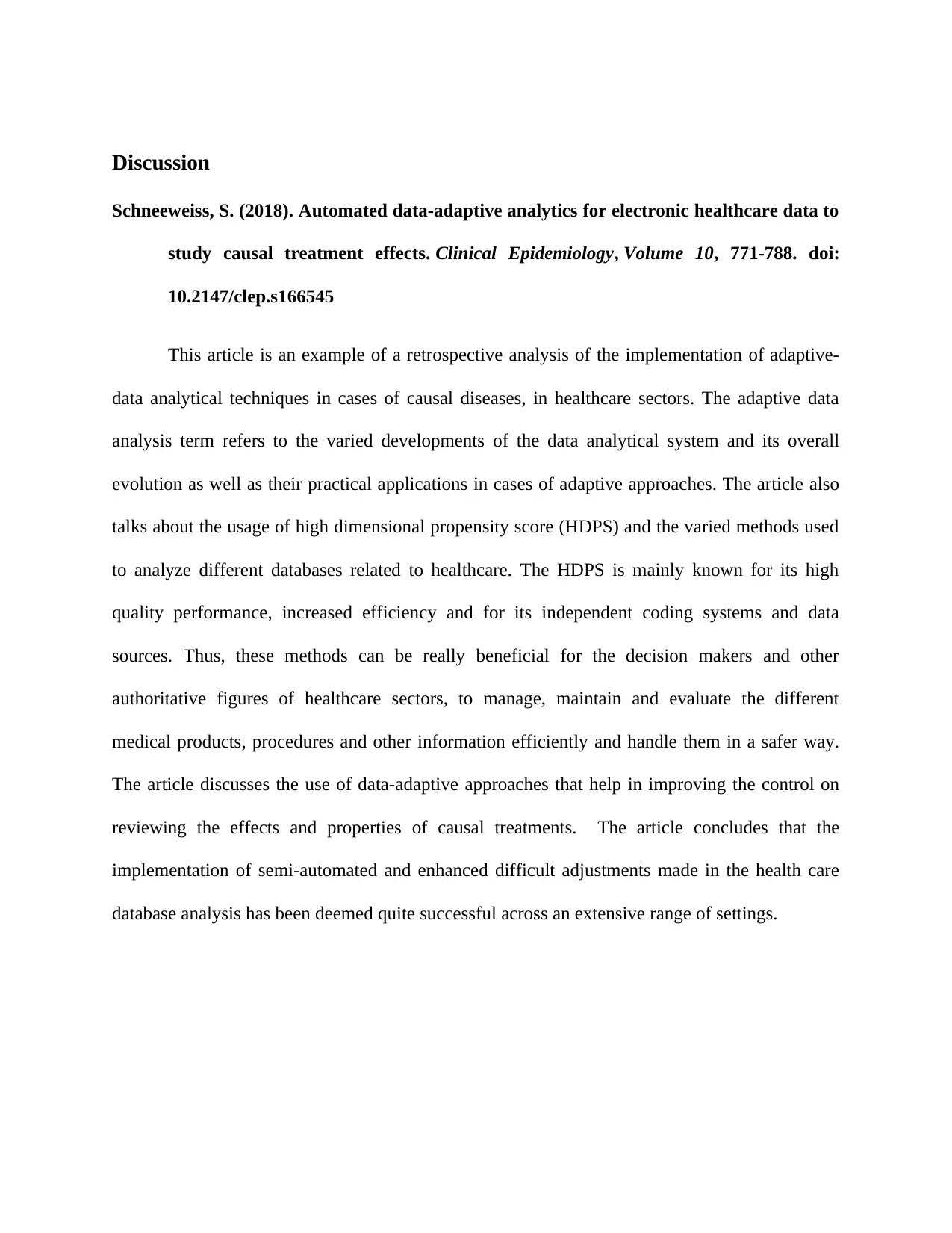
Discussion
Schneeweiss, S. (2018). Automated data-adaptive analytics for electronic healthcare data to
study causal treatment effects. Clinical Epidemiology, Volume 10, 771-788. doi:
10.2147/clep.s166545
This article is an example of a retrospective analysis of the implementation of adaptive-
data analytical techniques in cases of causal diseases, in healthcare sectors. The adaptive data
analysis term refers to the varied developments of the data analytical system and its overall
evolution as well as their practical applications in cases of adaptive approaches. The article also
talks about the usage of high dimensional propensity score (HDPS) and the varied methods used
to analyze different databases related to healthcare. The HDPS is mainly known for its high
quality performance, increased efficiency and for its independent coding systems and data
sources. Thus, these methods can be really beneficial for the decision makers and other
authoritative figures of healthcare sectors, to manage, maintain and evaluate the different
medical products, procedures and other information efficiently and handle them in a safer way.
The article discusses the use of data-adaptive approaches that help in improving the control on
reviewing the effects and properties of causal treatments. The article concludes that the
implementation of semi-automated and enhanced difficult adjustments made in the health care
database analysis has been deemed quite successful across an extensive range of settings.
Schneeweiss, S. (2018). Automated data-adaptive analytics for electronic healthcare data to
study causal treatment effects. Clinical Epidemiology, Volume 10, 771-788. doi:
10.2147/clep.s166545
This article is an example of a retrospective analysis of the implementation of adaptive-
data analytical techniques in cases of causal diseases, in healthcare sectors. The adaptive data
analysis term refers to the varied developments of the data analytical system and its overall
evolution as well as their practical applications in cases of adaptive approaches. The article also
talks about the usage of high dimensional propensity score (HDPS) and the varied methods used
to analyze different databases related to healthcare. The HDPS is mainly known for its high
quality performance, increased efficiency and for its independent coding systems and data
sources. Thus, these methods can be really beneficial for the decision makers and other
authoritative figures of healthcare sectors, to manage, maintain and evaluate the different
medical products, procedures and other information efficiently and handle them in a safer way.
The article discusses the use of data-adaptive approaches that help in improving the control on
reviewing the effects and properties of causal treatments. The article concludes that the
implementation of semi-automated and enhanced difficult adjustments made in the health care
database analysis has been deemed quite successful across an extensive range of settings.
⊘ This is a preview!⊘
Do you want full access?
Subscribe today to unlock all pages.

Trusted by 1+ million students worldwide
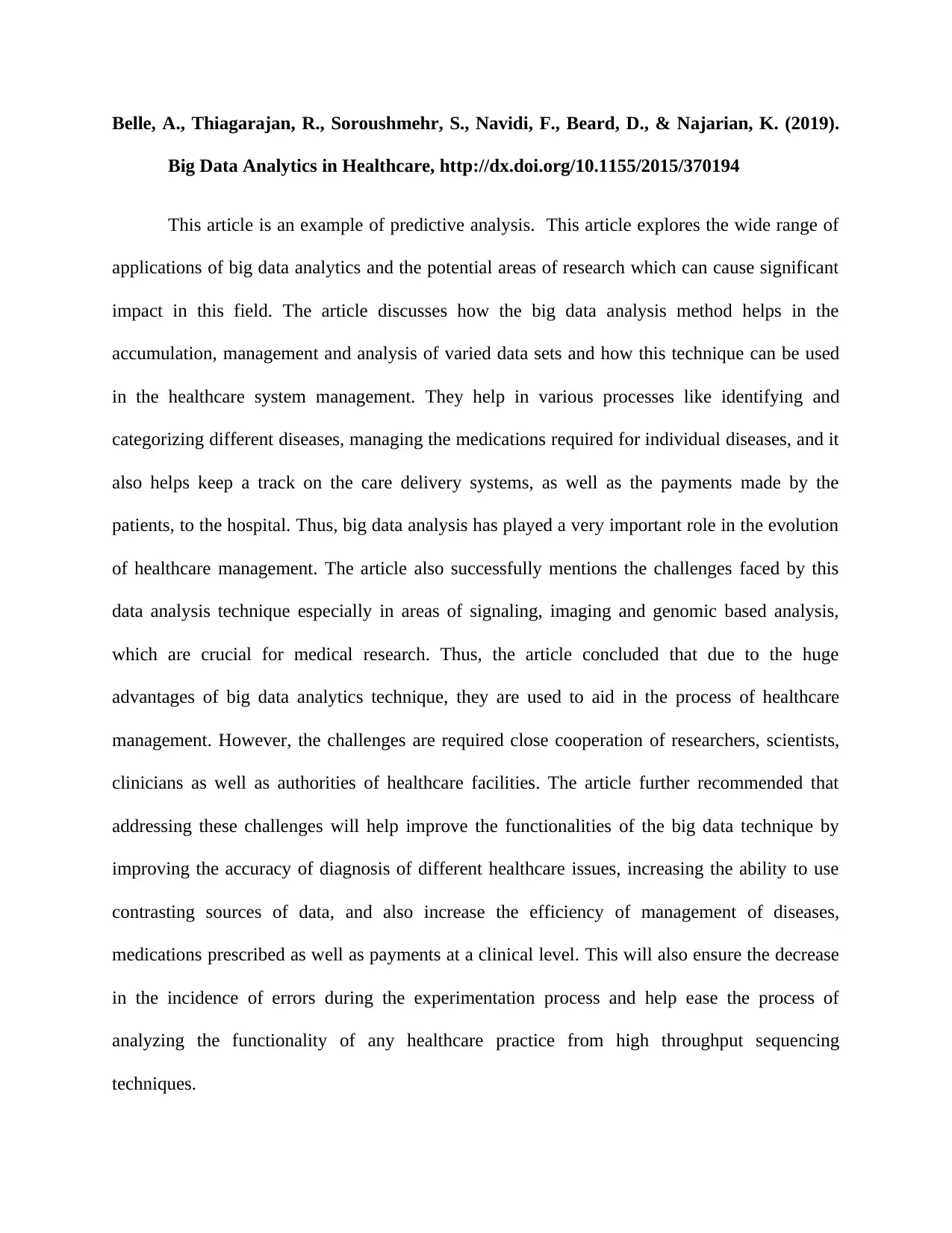
Belle, A., Thiagarajan, R., Soroushmehr, S., Navidi, F., Beard, D., & Najarian, K. (2019).
Big Data Analytics in Healthcare, http://dx.doi.org/10.1155/2015/370194
This article is an example of predictive analysis. This article explores the wide range of
applications of big data analytics and the potential areas of research which can cause significant
impact in this field. The article discusses how the big data analysis method helps in the
accumulation, management and analysis of varied data sets and how this technique can be used
in the healthcare system management. They help in various processes like identifying and
categorizing different diseases, managing the medications required for individual diseases, and it
also helps keep a track on the care delivery systems, as well as the payments made by the
patients, to the hospital. Thus, big data analysis has played a very important role in the evolution
of healthcare management. The article also successfully mentions the challenges faced by this
data analysis technique especially in areas of signaling, imaging and genomic based analysis,
which are crucial for medical research. Thus, the article concluded that due to the huge
advantages of big data analytics technique, they are used to aid in the process of healthcare
management. However, the challenges are required close cooperation of researchers, scientists,
clinicians as well as authorities of healthcare facilities. The article further recommended that
addressing these challenges will help improve the functionalities of the big data technique by
improving the accuracy of diagnosis of different healthcare issues, increasing the ability to use
contrasting sources of data, and also increase the efficiency of management of diseases,
medications prescribed as well as payments at a clinical level. This will also ensure the decrease
in the incidence of errors during the experimentation process and help ease the process of
analyzing the functionality of any healthcare practice from high throughput sequencing
techniques.
Big Data Analytics in Healthcare, http://dx.doi.org/10.1155/2015/370194
This article is an example of predictive analysis. This article explores the wide range of
applications of big data analytics and the potential areas of research which can cause significant
impact in this field. The article discusses how the big data analysis method helps in the
accumulation, management and analysis of varied data sets and how this technique can be used
in the healthcare system management. They help in various processes like identifying and
categorizing different diseases, managing the medications required for individual diseases, and it
also helps keep a track on the care delivery systems, as well as the payments made by the
patients, to the hospital. Thus, big data analysis has played a very important role in the evolution
of healthcare management. The article also successfully mentions the challenges faced by this
data analysis technique especially in areas of signaling, imaging and genomic based analysis,
which are crucial for medical research. Thus, the article concluded that due to the huge
advantages of big data analytics technique, they are used to aid in the process of healthcare
management. However, the challenges are required close cooperation of researchers, scientists,
clinicians as well as authorities of healthcare facilities. The article further recommended that
addressing these challenges will help improve the functionalities of the big data technique by
improving the accuracy of diagnosis of different healthcare issues, increasing the ability to use
contrasting sources of data, and also increase the efficiency of management of diseases,
medications prescribed as well as payments at a clinical level. This will also ensure the decrease
in the incidence of errors during the experimentation process and help ease the process of
analyzing the functionality of any healthcare practice from high throughput sequencing
techniques.
Paraphrase This Document
Need a fresh take? Get an instant paraphrase of this document with our AI Paraphraser
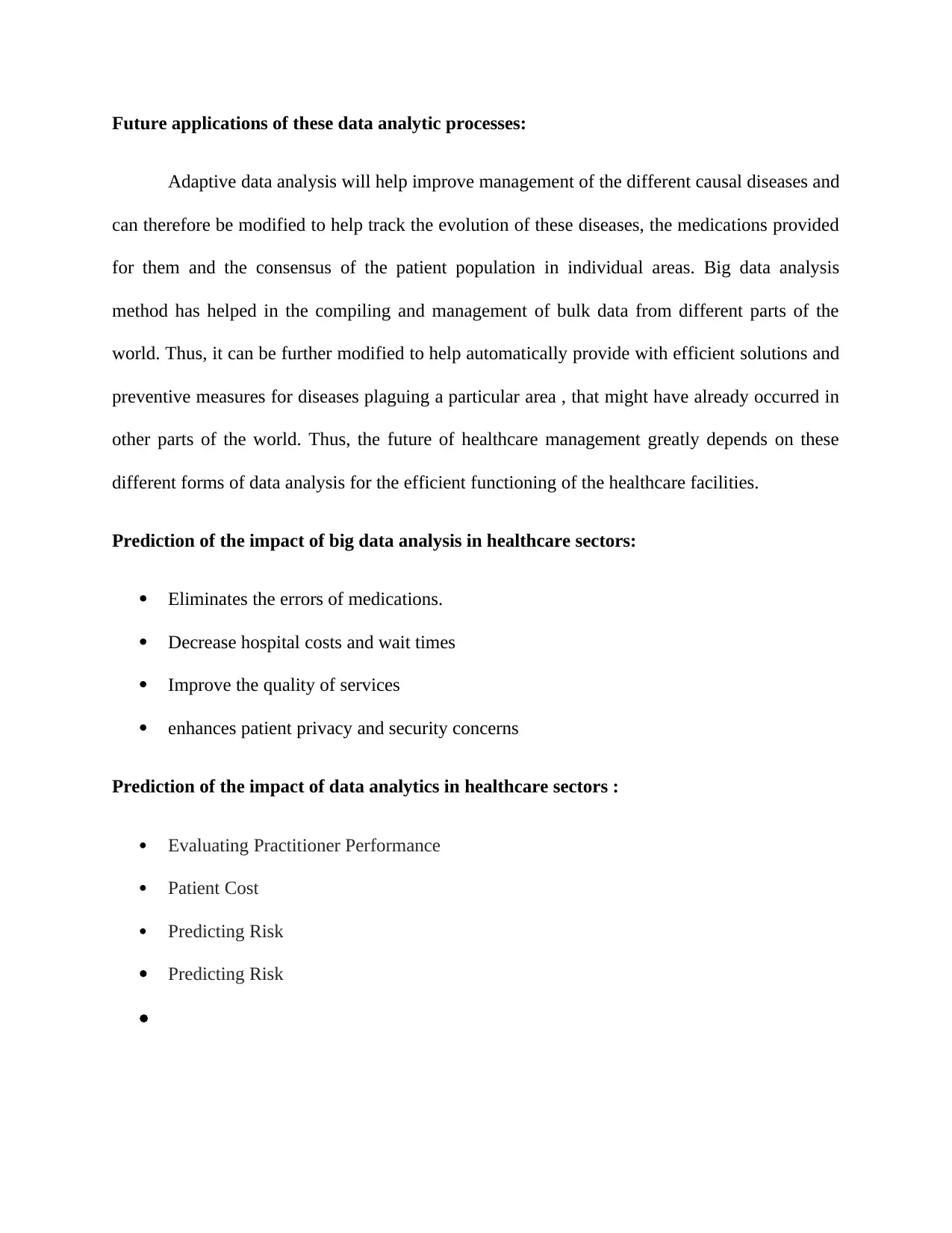
Future applications of these data analytic processes:
Adaptive data analysis will help improve management of the different causal diseases and
can therefore be modified to help track the evolution of these diseases, the medications provided
for them and the consensus of the patient population in individual areas. Big data analysis
method has helped in the compiling and management of bulk data from different parts of the
world. Thus, it can be further modified to help automatically provide with efficient solutions and
preventive measures for diseases plaguing a particular area , that might have already occurred in
other parts of the world. Thus, the future of healthcare management greatly depends on these
different forms of data analysis for the efficient functioning of the healthcare facilities.
Prediction of the impact of big data analysis in healthcare sectors:
Eliminates the errors of medications.
Decrease hospital costs and wait times
Improve the quality of services
enhances patient privacy and security concerns
Prediction of the impact of data analytics in healthcare sectors :
Evaluating Practitioner Performance
Patient Cost
Predicting Risk
Predicting Risk
Adaptive data analysis will help improve management of the different causal diseases and
can therefore be modified to help track the evolution of these diseases, the medications provided
for them and the consensus of the patient population in individual areas. Big data analysis
method has helped in the compiling and management of bulk data from different parts of the
world. Thus, it can be further modified to help automatically provide with efficient solutions and
preventive measures for diseases plaguing a particular area , that might have already occurred in
other parts of the world. Thus, the future of healthcare management greatly depends on these
different forms of data analysis for the efficient functioning of the healthcare facilities.
Prediction of the impact of big data analysis in healthcare sectors:
Eliminates the errors of medications.
Decrease hospital costs and wait times
Improve the quality of services
enhances patient privacy and security concerns
Prediction of the impact of data analytics in healthcare sectors :
Evaluating Practitioner Performance
Patient Cost
Predicting Risk
Predicting Risk
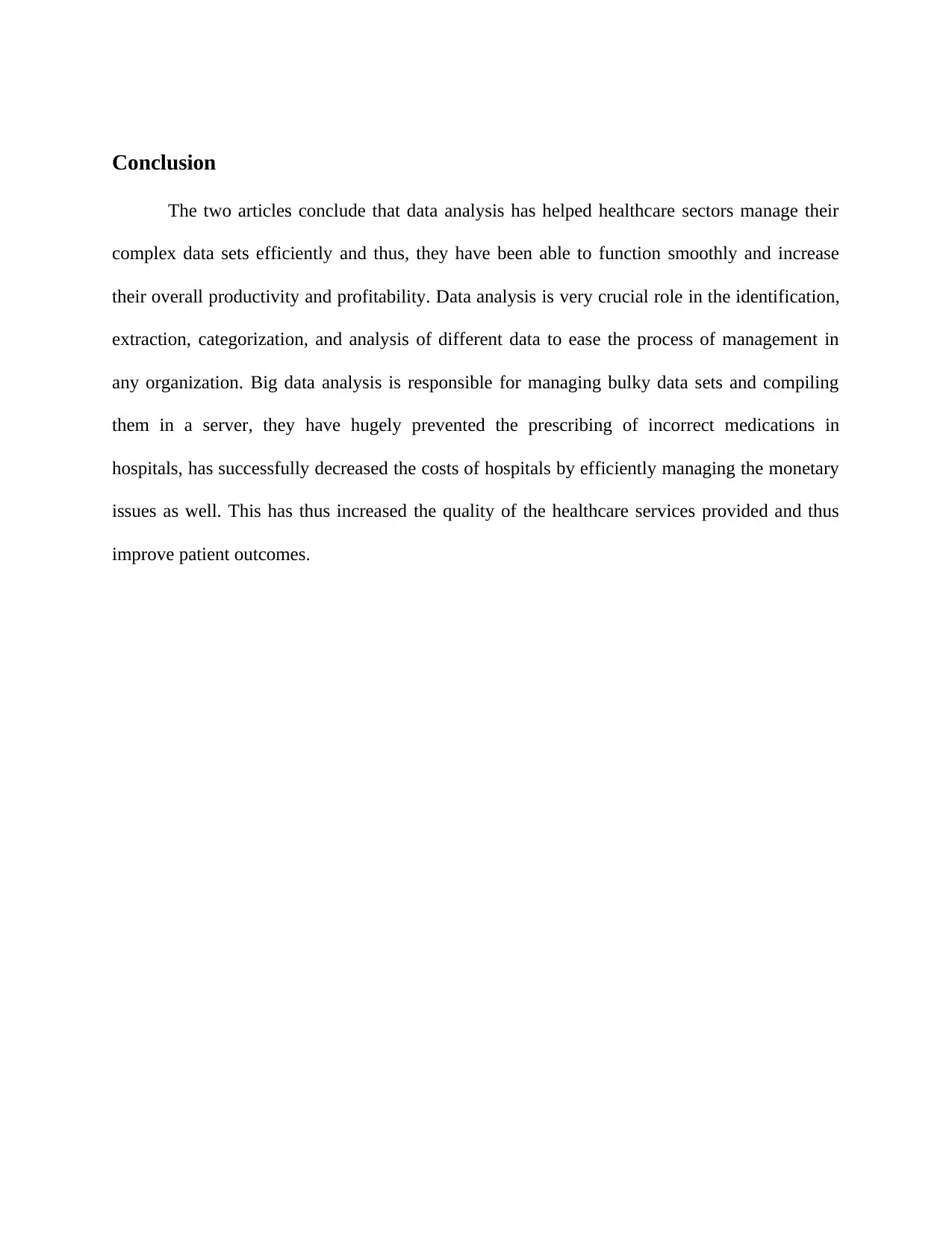
Conclusion
The two articles conclude that data analysis has helped healthcare sectors manage their
complex data sets efficiently and thus, they have been able to function smoothly and increase
their overall productivity and profitability. Data analysis is very crucial role in the identification,
extraction, categorization, and analysis of different data to ease the process of management in
any organization. Big data analysis is responsible for managing bulky data sets and compiling
them in a server, they have hugely prevented the prescribing of incorrect medications in
hospitals, has successfully decreased the costs of hospitals by efficiently managing the monetary
issues as well. This has thus increased the quality of the healthcare services provided and thus
improve patient outcomes.
The two articles conclude that data analysis has helped healthcare sectors manage their
complex data sets efficiently and thus, they have been able to function smoothly and increase
their overall productivity and profitability. Data analysis is very crucial role in the identification,
extraction, categorization, and analysis of different data to ease the process of management in
any organization. Big data analysis is responsible for managing bulky data sets and compiling
them in a server, they have hugely prevented the prescribing of incorrect medications in
hospitals, has successfully decreased the costs of hospitals by efficiently managing the monetary
issues as well. This has thus increased the quality of the healthcare services provided and thus
improve patient outcomes.
⊘ This is a preview!⊘
Do you want full access?
Subscribe today to unlock all pages.

Trusted by 1+ million students worldwide
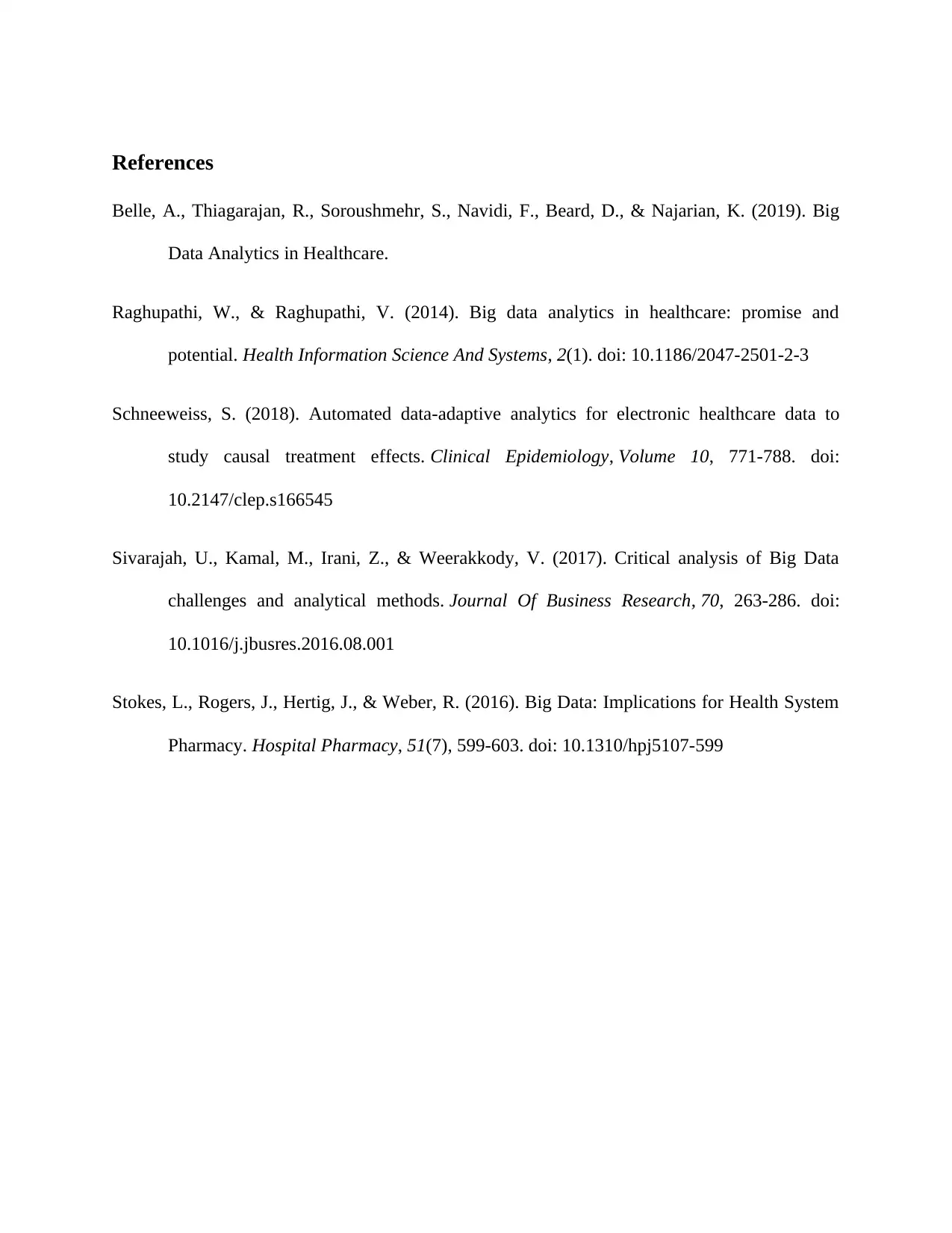
References
Belle, A., Thiagarajan, R., Soroushmehr, S., Navidi, F., Beard, D., & Najarian, K. (2019). Big
Data Analytics in Healthcare.
Raghupathi, W., & Raghupathi, V. (2014). Big data analytics in healthcare: promise and
potential. Health Information Science And Systems, 2(1). doi: 10.1186/2047-2501-2-3
Schneeweiss, S. (2018). Automated data-adaptive analytics for electronic healthcare data to
study causal treatment effects. Clinical Epidemiology, Volume 10, 771-788. doi:
10.2147/clep.s166545
Sivarajah, U., Kamal, M., Irani, Z., & Weerakkody, V. (2017). Critical analysis of Big Data
challenges and analytical methods. Journal Of Business Research, 70, 263-286. doi:
10.1016/j.jbusres.2016.08.001
Stokes, L., Rogers, J., Hertig, J., & Weber, R. (2016). Big Data: Implications for Health System
Pharmacy. Hospital Pharmacy, 51(7), 599-603. doi: 10.1310/hpj5107-599
Belle, A., Thiagarajan, R., Soroushmehr, S., Navidi, F., Beard, D., & Najarian, K. (2019). Big
Data Analytics in Healthcare.
Raghupathi, W., & Raghupathi, V. (2014). Big data analytics in healthcare: promise and
potential. Health Information Science And Systems, 2(1). doi: 10.1186/2047-2501-2-3
Schneeweiss, S. (2018). Automated data-adaptive analytics for electronic healthcare data to
study causal treatment effects. Clinical Epidemiology, Volume 10, 771-788. doi:
10.2147/clep.s166545
Sivarajah, U., Kamal, M., Irani, Z., & Weerakkody, V. (2017). Critical analysis of Big Data
challenges and analytical methods. Journal Of Business Research, 70, 263-286. doi:
10.1016/j.jbusres.2016.08.001
Stokes, L., Rogers, J., Hertig, J., & Weber, R. (2016). Big Data: Implications for Health System
Pharmacy. Hospital Pharmacy, 51(7), 599-603. doi: 10.1310/hpj5107-599
1 out of 7
Related Documents
Your All-in-One AI-Powered Toolkit for Academic Success.
+13062052269
info@desklib.com
Available 24*7 on WhatsApp / Email
![[object Object]](/_next/static/media/star-bottom.7253800d.svg)
Unlock your academic potential
Copyright © 2020–2026 A2Z Services. All Rights Reserved. Developed and managed by ZUCOL.




